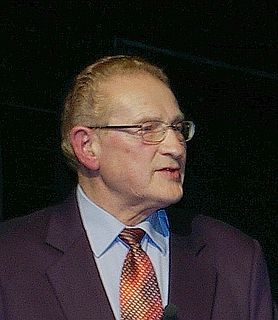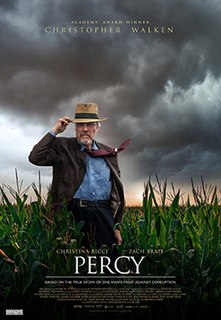Related Research Articles

Alfalfa, also called lucerne, is a perennial flowering plant in the legume family Fabaceae. It is cultivated as an important forage crop in many countries around the world. It is used for grazing, hay, and silage, as well as a green manure and cover crop. The name alfalfa is used in North America. The name lucerne is the more commonly used name in the United Kingdom, South Africa, Australia, and New Zealand. The plant superficially resembles clover, especially while young, when trifoliate leaves comprising round leaflets predominate. Later in maturity, leaflets are elongated. It has clusters of small purple flowers followed by fruits spiralled in 2 to 3 turns containing 10–20 seeds. Alfalfa is native to warmer temperate climates. It has been cultivated as livestock fodder since at least the era of the ancient Greeks and Romans.
The Monsanto Company was an American agrochemical and agricultural biotechnology corporation founded in 1901 and headquartered in Creve Coeur, Missouri. Monsanto's best known product is Roundup, a glyphosate-based herbicide, developed in the 1970s. Later the company became a major producer of genetically engineered crops. In 2018, the company ranked 199th on the Fortune 500 of the largest United States corporations by revenue.

Percy Schmeiser was a Canadian businessman, farmer, and politician. In 1954, he took over the operations of the family owned farm, gas station, and farm equipment dealership. He renamed the farm equipment dealership Schmeiser's Garage and added a second farm equipment dealership in Humboldt, Saskatchewan in 1986 and oversaw their operations until their sale in 2003.
As with all utility patents in the United States, a biological patent provides the patent holder with the right to exclude others from making, using, selling, or importing the claimed invention or discovery in biology for a limited period of time - for patents filed after 1998, 20 years from the filing date.

Monsanto Canada Inc v Schmeiser [2004] 1 S.C.R. 902, 2004 SCC 34 is a leading Supreme Court of Canada case on patent rights for biotechnology, between a Canadian canola farmer, Percy Schmeiser, and the agricultural biotechnology company Monsanto. The court heard the question of whether Schmeiser's intentionally growing genetically modified plants constituted "use" of Monsanto's patented genetically modified plant cells. By a 5-4 majority, the court ruled that it did. The Supreme Court also ruled 9-0 that Schmeiser did not have to pay Monsanto their technology use fee, damages or costs, as Schmeiser did not receive any benefit from the technology. The case drew worldwide attention and is widely misunderstood to concern what happens when farmers' fields are accidentally contaminated with patented seed. However, by the time the case went to trial, all claims of accidental contamination had been dropped; the court only considered the GM canola in Schmeiser's fields, which Schmeiser had intentionally concentrated and planted. Schmeiser did not put forward any defence of accidental contamination.
Southern Exposure Seed Exchange (SESE) is a cooperatively-owned seed company. SESE is a source for heirloom seeds and other open-pollinated (non-hybrid) seeds with an emphasis on vegetables, flowers, and herbs that grow well in the Mid-Atlantic region. SESE also supports seed saving and traditional seed breeding through their product line, through lectures and workshops, and by working with over 50 small seed-growing farmers in the Mid-Atlantic and other parts of the United States. SESE publishes an intermittent email newsletter and blog for gardeners, as well as the Southern Exposure Seed Exchange Catalog and Garden Guide.
Since the advent of genetic engineering in the 1970s, concerns have been raised about the dangers of the technology. Laws, regulations, and treaties were created in the years following to contain genetically modified organisms and prevent their escape. Nevertheless, there are several examples of failure to keep GM crops separate from conventional ones.

Genetically modified food controversies are disputes over the use of foods and other goods derived from genetically modified crops instead of conventional crops, and other uses of genetic engineering in food production. The disputes involve consumers, farmers, biotechnology companies, governmental regulators, non-governmental organizations, and scientists. The key areas of controversy related to genetically modified food are whether such food should be labeled, the role of government regulators, the objectivity of scientific research and publication, the effect of genetically modified crops on health and the environment, the effect on pesticide resistance, the impact of such crops for farmers, and the role of the crops in feeding the world population. In addition, products derived from GMO organisms play a role in the production of ethanol fuels and pharmaceuticals.
Naomi Lynn Reice Buchwald is a Senior United States District Judge of the United States District Court for the Southern District of New York.

Mendocino County, California, was the first jurisdiction in the United States to ban the cultivation, production or distribution of genetically modified organisms (GMOs). The ordinance, entitled Measure H, was passed by referendum on March 2, 2004. Initiated by the group "GMO Free Mendocino", the campaign was a highly publicized grassroots effort by local farmers and environmental groups who contend that the potential risks of GMOs to human health and the ecosystem have not yet been fully understood. The measure was met with opposition by several interest groups representing the biotechnology industry, The California Plant Health Association and CropLife America, a Washington-based consortium whose clients represent some of the largest food distributors in the nation, including Monsanto, DuPont and Dow Chemical. Since the enactment of the ordinance, Mendocino County has been added to an international list of "GMO free zones." Pre-emptive statutes banning local municipalities from such ordinances have now become widespread with adoption in sixteen states.
Monsanto Co. v. Geertson Seed Farms, 561 U.S. 139 (2010), is a United States Supreme Court case decided 7-1 in favor of Monsanto. The decision allowed Monsanto to sell genetically modified alfalfa seeds to farmers, and allowed farmers to plant them, grow crops, harvest them, and sell the crop into the food supply. The case came about because the use of the seeds was approved by regulatory authorities; the approval was challenged in district court by Geertson Seed Farms and other groups who were concerned that the genetically modified alfalfa would spread too easily, and the challengers won. Monsanto appealed the district court decision and lost, and appealed again to the Supreme Court, where Monsanto won, thus upholding the original approval and allowing the seeds to be sold.

In Canadian patent law, only “inventions” are patentable. Under the Patent Act, only certain categories of things may be considered and defined as inventions. Therefore, if a patent discloses an item that fulfills the requirements of novelty, non-obviousness and utility, it may nonetheless be found invalid on the grounds that it does not fall within one of the statutory categories of “invention”. Since the Patent Act, the categories of patentable subject matter have been defined and interpreted by Canadian courts.
The Farmer Assurance Provision refers to Section 735 of US H.R. 933, a bill that was passed by the Senate on March 20, 2013, and then signed into law as part of the Consolidated and Further Continuing Appropriations Act, 2013 by President Barack Obama on March 26, 2013. The provisions of this law remained in effect for six months, until the end of the fiscal year on September 30, 2013. The Farmer Assurance Provision was discontinued in Sec. 101 of the Continuing Appropriations Act, 2014. The bill is commonly referred to as the "Monsanto Protection Act" by its critics.
Bowman v. Monsanto Co., 569 U.S. 278 (2013), was a United States Supreme Court patent decision in which the Court unanimously affirmed the decision of the Federal Circuit that the patent exhaustion doctrine does not permit a farmer to plant and grow saved, patented seeds without the patent owner's permission. The case arose after Vernon Hugh Bowman, an Indiana farmer, bought transgenic soybean crop seeds from a local grain elevator for his second crop of the season. Monsanto originally sold the seed from which these soybeans were grown to farmers under a limited use license that prohibited the farmer-buyer from using the seeds for more than a single season or from saving any seed produced from the crop for replanting. The farmers sold their soybean crops to the local grain elevator, from which Bowman then bought them. After Bowman replanted the crop seeds for his second harvest, Monsanto filed a lawsuit claiming that he infringed on their patents by replanting soybeans without a license. In response, Bowman argued that Monsanto's claims were barred under the doctrine of patent exhaustion, because all future generations of soybeans were embodied in the first generation that was originally sold.
Jim Gerritsen is an American farmer and activist from Maine. He is mostly known for his involvements in the politics of Organic Faming as the proponent of the same. Gerritsen is President of the Maine-based national trade organization Organic Seed Growers and Trade Association (OSGATA).
Monsanto was involved in several high-profile lawsuits, as both plaintiff and defendant. It had been defendant in a number of lawsuits over health and environmental issues related to its products. Monsanto also made frequent use of the courts to defend its patents, particularly in the area of agricultural biotechnology.
J. E. M. Ag Supply, Inc. v. Pioneer Hi-Bred International, Inc., 534 U.S. 124 (2001), was a decision of the United States Supreme Court holding for the first time that utility patents may be issued for crops and other flowering plants under 35 U.S.C. § 101. The Supreme Court rejected the argument that the exclusive ways to protect these plants are under the Plant Variety Protection Act (PVPA), 7 U.S.C. § 2321, and the Plant Patent Act of 1930 (PPA), 35 U.S.C. §§ 161-164.
A genetically modified sugar beet is a sugar beet that has been genetically engineered by the direct modification of its genome using biotechnology. Commercialized GM sugar beets make use of a glyphosate-resistance modification developed by Monsanto and KWS Saat. These glyphosate-resistant beets, also called 'Roundup Ready' sugar beets, were developed by 2000, but not commercialized until 2007. For international trade, sugar beets have a Maximum Residue Limit of glyphosate of 15 mg/Kg at harvest. As of 2016, GMO sugar beets are grown in the United States and Canada. In the United States, they play an important role in domestic sugar production. Studies have concluded the sugar from glyphosate-resistant sugar beets is molecularly identical to and so has the same nutritional value as sugar from conventional (non-GMO) sugar beets.

Percy is a 2020 Canadian-American-Indian biographical drama film, directed by Clark Johnson from a screenplay by Garfield Lindsay Miller and Hilary Pryor. It stars Christopher Walken, Christina Ricci, Zach Braff, Luke Kirby, Adam Beach, Martin Donovan, Roberta Maxwell and Peter Stebbings. The film follows 70-year-old small-town Saskatchewan farmer Percy Schmeiser, who takes on a giant corporation after their GMOs interfere with his crops.

Rapeseed oil is one of the oldest known vegetable oils. There are both edible and industrial forms produced from the seed of several cultivars of the plant family Brassicaceae. Historically, it was eaten in limited quantities due to high levels of erucic acid, which is damaging to cardiac muscle of animals and imparts a bitter taste, and glucosinolates, which made it less nutritious in animal feed. Rapeseed oil can contain up to 54% erucic acid.
References
- ↑ Monsanto versus the people, Aljazeera. January 14, 2013.
- ↑ Organic Farmers Rally Against Seed Patents Newsplex.com, May 15, 2013
- ↑ Monsanto critics denied U.S. Supreme Court hearing on seed patents
- ↑ Canadian Federal Court decision, para 53